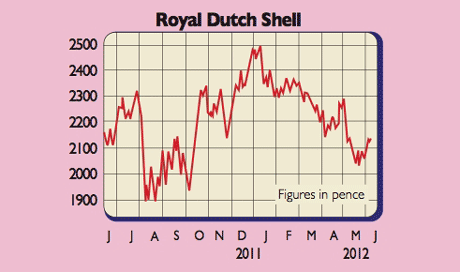Get the latest financial news, insights and expert analysis from our award-winning MoneyWeek team, to help you understand what really matters when it comes to your finances.
You are now subscribed
Your newsletter sign-up was successful
Want to add more newsletters?

Twice daily
MoneyWeek
Get the latest financial news, insights and expert analysis from our award-winning MoneyWeek team, to help you understand what really matters when it comes to your finances.

Four times a week
Look After My Bills
Sign up to our free money-saving newsletter, filled with the latest news and expert advice to help you find the best tips and deals for managing your bills. Start saving today!
As the storm clouds gather ahead of Sunday's Greek elections, sovereign wealth funds like the Qatar Investment Authority (QIA) are pouring billions into blue-chip stocks. In May, QIA bought a big stake in Shell after the oil giant delivered better-than-expected first-quarter results. Here's why you should follow suit.
Underlying earnings surged 16% to $7.3bn with the quarterly dividend nudging up 1 to $0.43. That was thanks to a clutch of development projects that are now bearing fruit. These include Pearl, Shell's flagship $18bn plant in Qatar that converts natural gas into liquid fuels, and the expansion of its oil sands operation in Canada.
Another boost came when Japanese demand for liquefied natural gas (LNG) was stepped up following the Fukushima disaster in March 2011. This helped Shell overcome lower US natural gas prices, and "continued challenges" in its refining and marketing division.
MoneyWeek
Subscribe to MoneyWeek today and get your first six magazine issues absolutely FREE

Sign up to Money Morning
Don't miss the latest investment and personal finances news, market analysis, plus money-saving tips with our free twice-daily newsletter
Don't miss the latest investment and personal finances news, market analysis, plus money-saving tips with our free twice-daily newsletter
CEO Peter Vosser has flagged "a new growth agenda", which entails net capital investment of $30bn this year 80% being earmarked for drilling, production and exploration. The aim is to lift output to four million barrels of oil equivalent per day (boepd) by 2017, up 12% from today's 3.55 million.
The good news is that this investment should be easily financed via the firm's cash-machine it is set to churn out $175bn-$200bn of funds (pre-capex) by 2015. That's good news for income-seekers in this ultra low interest rate environment. What's more, Shell's 2011 headline reserve replacement ratio came in at an impressive 120%. To translate: as at the end of December, it had total proved reserves of 14.2 billion, equivalent to 12 years' production.
Royal Dutch Shell (LSE: RDSB), rated a BUY by Goldman Sachs

Analysts are predicting 2012 turnover of £293bn, earnings per share (EPS) of 286p and a chunky 109p dividend. That puts the stock on an undemanding price/earnings (p/e) ratio of 7.5, with a 5% yield. I would rate the stock on an operating cashflow multiple of seven. Adjusting for net debt of $19.8bn, a $6.6bn pension deficit and $19bn of future decommissioning costs, generates an intrinsic worth of £27.50 per share.
There are a few risks. Shell is exposed to volatile oil and gas prices and variable refining margins. It also has substantial assets in geopolitically febrile regions such as Russia and the Middle East. All the same, Shell is a monster money-spinner. And despite the falls in crude recently, emerging-market growth and constrained supply should continue to keep markets tight for many years ahead.
Second-quarter results are due out on 26 July. Goldman Sachs has a price target of £29.80.
Paul Hill also writes a weekly share-tipping newsletter, Precision Guided Investments. See www.moneyweek.com/PGI or phone 020-7633 3634 for more.
Get the latest financial news, insights and expert analysis from our award-winning MoneyWeek team, to help you understand what really matters when it comes to your finances.
Paul gained a degree in electrical engineering and went on to qualify as a chartered management accountant. He has extensive corporate finance and investment experience and is a member of the Securities Institute.
Over the past 16 years Paul has held top-level financial management and M&A roles for blue-chip companies such as O2, GKN and Unilever. He is now director of his own capital investment and consultancy firm, PMH Capital Limited.
Paul is an expert at analysing companies in new, fast-growing markets, and is an extremely shrewd stock-picker.
-
 Early signs of the AI apocalypse?
Early signs of the AI apocalypse?Uncertainty is rife as investors question what the impact of AI will be.
-
 Reach for the stars to boost Britain's space industry
Reach for the stars to boost Britain's space industryopinion We can’t afford to neglect Britain's space industry. Unfortunately, the government is taking completely the wrong approach, says Matthew Lynn